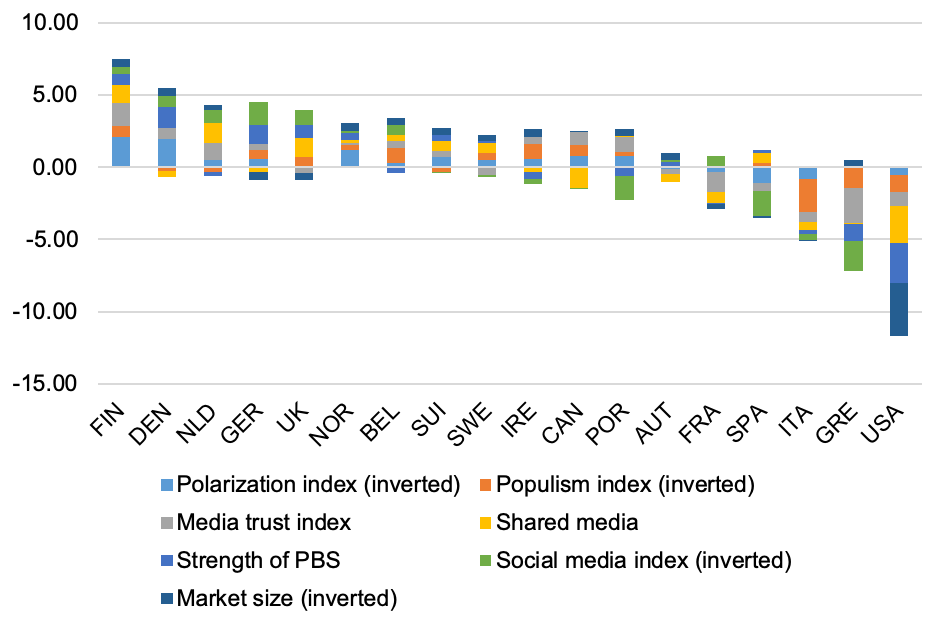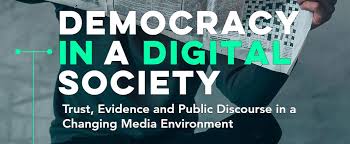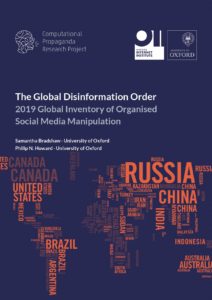
Why are some democracies better equipped to face the problems of the digital era, demonstrating a resilience to manipulation and disinformation? asks Edda Humprecht, a Senior Research and Teaching Associate at the University of Zurich.
In new research with Frank Esser and Peter Van Aelst,* we identified the structural conditions that are theoretically linked to resilience to online disinformation, which relate to different political, media and economic environments, she adds. To test these expectations, we then identified quantifiable indicators for these theoretical conditions, which allowed us to measure their significance for 18 Western democracies.
A cluster analysis then yielded three country groups: one group with high resilience to online disinformation (including the Northern European countries) and two country groups with low resilience (including Southern European countries and the US), Humprecht writes for Democratic Audit:
 In polarised political environments, citizens are confronted with different deviating representations of reality and therefore it becomes increasingly difficult for them to distinguish between false and correct information. Thus, societal polarisation is likely to decrease resilience to online disinformation.
In polarised political environments, citizens are confronted with different deviating representations of reality and therefore it becomes increasingly difficult for them to distinguish between false and correct information. Thus, societal polarisation is likely to decrease resilience to online disinformation. - Moreover, research has shown that both populism and partisan disinformation share a binary Manichaean worldview, comprising anti-elitism, mistrust of expert knowledge and a belief in conspiracy theories. As a consequence of these combined influences, citizens can obtain inaccurate perceptions of reality. Thus, in environments with high levels of populist communication, online users are exposed to more disinformation.
- Another condition that has been linked to resilience to online disinformation in previous research is trust in news media. Previous research has shown that in environments in which distrust in news media is higher, people are less likely to be exposed to a variety of sources of political information and to critically evaluate those.
 Civil society groups and digital rights activists struggled to curb the tide of disinformation and faced several obstacles to observing social media during elections, according to a new analysis from the Oxford Internet Institute, which tracked the dissemination of online disinformation and hate speech during the 2019 Tunisian elections.
Civil society groups and digital rights activists struggled to curb the tide of disinformation and faced several obstacles to observing social media during elections, according to a new analysis from the Oxford Internet Institute, which tracked the dissemination of online disinformation and hate speech during the 2019 Tunisian elections.
The latest data memo from the Computational Propaganda project, co-authored by lead researcher Mona Elswah and Professor Philip N. Howard, “The Challenges of Monitoring Social Media in the Arab World: The Case of the 2019 Tunisian Elections”, gauges the spread of online disinformation and the effectiveness of existing laws.
“Our study shines a light on the challenges facing Tunisian civil society groups and digital rights activists in the digital age,” said Elswah, lead author of the data memo. “Civil society groups and activists need better access to Facebook data on political advertising to enable them to assess the prevalence of disinformation in political campaigning and its implications for Tunisian democracy”. Download the full report
Digitisation is a double-edged sword in the Arab world, says a new report. While new technologies can improve transparency and accountability, they can also provide authoritarian regimes with the means to monitor citizens and crack down on dissent. In a new policy brief for the European Council on Foreign Relations, Manuel Langendorf analyses the ways in which countries in the region have stepped up digitisation efforts in recent years, focusing on the United Arab Emirates and Jordan.
* Edda Humprecht, Frank Esser, & Peter Van Aelst, ‘Resilience to Online Disinformation: A Framework for Cross-National Comparative Research‘, published in The International Journal of Press/Politics.







